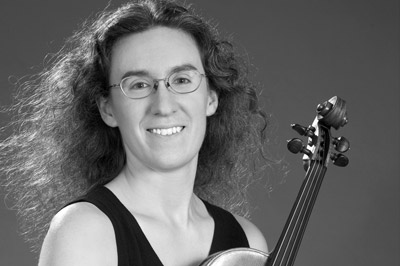 Sarah Darling owes the fact that she is still a musician to her wonderful parents, who should have given up on her at age 5, but didn't! Let's just say that at the time she wasn't a model student - and certainly hadn't figured out how practicing and lessons had anything to do with music. They gave her the option of quitting - but casually mentioned that if she stopped playing, she'd have to bring her violin back to the shop. Sarah can't remember if tears were shed, but she definitely managed to hang on to her fiddle. The rest, as they say, is history.
Sarah Darling owes the fact that she is still a musician to her wonderful parents, who should have given up on her at age 5, but didn't! Let's just say that at the time she wasn't a model student - and certainly hadn't figured out how practicing and lessons had anything to do with music. They gave her the option of quitting - but casually mentioned that if she stopped playing, she'd have to bring her violin back to the shop. Sarah can't remember if tears were shed, but she definitely managed to hang on to her fiddle. The rest, as they say, is history.
These days, Sarah is an insatiable musician, deeply grateful to the city of Boston for supporting her habit. What she craves is simple, really: just to play as much music as possible at the highest level possible while reaching out in as many ways as possible. She hopes she won't have to rewrite the laws of physics in order to make this happen, though she might not be opposed to donning a Batsuit or brandishing the occasional Time-Turner, if that's what it takes.
Sarah got her undergraduate degree from Harvard University while studying with the ebuillent James Dunham, and with a year at Juilliard under the mythological Karen Tuttle added for good measure. A grant from the Beebe Fund led her to Amsterdam to work with the elemental Nobuko Imai, and an award from the DAAD took her to Freiburg where she earned an Artist Diploma with the energetic Wolfram Christ (and spent a couple years playing with the prizewinning Amaryllis-Quartett.) Finally, she came back to Boston for a Master's degree at NEC with the awe-inspiring Kim Kashkashian. She is currently in the DMA program there, glad to be be closing her educational circle by re-connecting music and scholarship.
In and around Boston, depending on when and where you look, you can catch Sarah playing with the Symphony, the Pops, Boston Baroque, the Handel and Haydn Society, the Portland and Rhode Island Symphonies, BMOP, the Callithumpian Consort, White Rabbit, the Sarasa Ensemble, the Radius Ensemble, Musicians of the Old Post Road, Les Bostonades, and the Harvard Baroque Chamber Orchestra, which she serves as Concertmaster and Assistant Director. Then there are the groups that she is intimately involved in as a founder or collaborator: the Arcturus Chamber Ensemble, Boston Hausmusik, the Conspiro Quartet, the Rosetta Trio, and of course, A Far Cry. Joining A Far Cry at the end of their first season, Sarah first experienced their white-hot performances as a stunned audience member and is thrilled to now be a part of the action.
She is indebted to several great viola works - Alfred Schnittke's Viola Concerto (and his terrifying Monologue), J.S. Bach's 6th Brandenburg Concerto, and Vaughan Williams' meditation on love, Flos Campi, for making it possible for her to solo with some wonderful groups on both sides of the Atlantic, including the Freiburg and NEC orchestras, and most recently, Joshua Rifkin's acclaimed Bach Ensemble (over there) and the Carmel Bach Festival Orchestra (over here.) Sarah would also like to make a plug for her newly released CD featuring the wild and whimsical sonatas of American composer Leland Smith, and available on Naxos Records.
When Sarah is not making music, chances are, she still is. She enjoys many other things - a good meal, a crazy conversation (auch auf Deutsch, bitte!), a long run, a riveting painting, an exhausting martial arts session, an intriguing book partnered with a cup of jade oolong - but sooner or later, it all gets connected - or metaphorically mixed up - with this music thing she loves. She is continually on the lookout for a really good theory that embraces the million ways that poetry and music intersect. All ideas are welcome!
...there is only the unattended Moment, the moment in and out of time, The distraction fit, lost in a shaft of sunlight, The wild thyme unseen, or the winter lightning Or the waterfall, or music heard so deeply That it is not heard at all, but you are the music While the music lasts. - T. S. Eliot, from "Four Quartets"
(photo: susanwilsonphoto.com)

